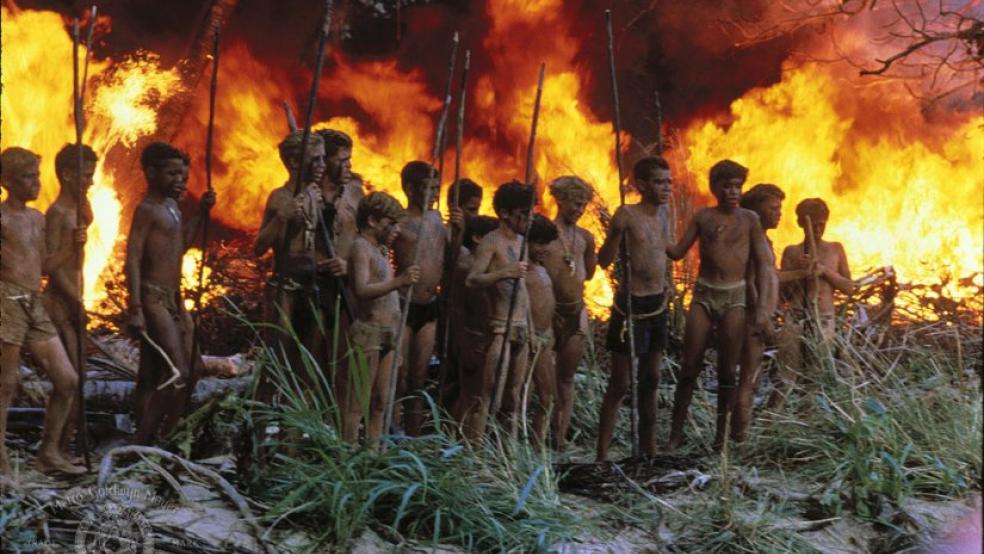Sometimes, it takes a Brit.
In the year since Donald Trump rode an escalator down to his Manhattan version of a political lobby, frustrated and often horrified American analysts have searched for his soul, trying to explain the unlikely appeal of a demagogue in our democracy. As it turns out, we — and he — are just living on the wrong island.
“I view myself as a person that, like everybody else, is fighting for survival,” Trump said in a recent interview.
Bingo.
He is ripped from the pages of Lord of the Flies, the 1954 novel (and later film) that illuminated raw and terrifying truths about human nature and helped Sir William Golding win the Nobel Prize in Literature.
Related: Ex-Trump Insider: Donald Doesn’t Want to Be President
To remind: it’s an allegory, about a group of English schoolboys who, being airlifted to safety from an unspecified war and atomic bomb attack, crash-land on a desert island. During their — yup — fight for survival, the once harmonious band of baby brothers splits into bitterly hostile tribes, whose descent into savagery defies millennia of proper British roots. It’s mind vs. body, selfish individuals vs. the common good, order vs. chaos — the same struggle that has engaged everyone from Plato to Freud and beyond. Spoiler alert: in Lord of the Flies, the dark side wins.
For Donald Trump, whose third-grade vocabulary and schoolyard insults reduce any opposition to a “loser,” it makes perfect, simplistic sense. “The world is a vicious and brutal place,” he wrote in 2007. “We think we’re civilized. In truth, it’s a cruel world and people are ruthless.”
In Lord of the Flies, it doesn’t start out that way. It never does. At first, twelve-year-old Ralph is elected leader, a rational little fellow urging rules and order, insisting they keep a fire burning to alert potential rescuers. He’s joined by the antihero, co-castaway Jack, whose primal desires to hunt and play seem subjugated to the cause. “We’ve got to have rules and obey them,” agrees Jack. “After all, we’re not savages.” But cue the ominous music. “We are English,” Jack goes on, “and the English are best at everything.” Or, as Donald Trump has crowed in this montage of statements, “I am the most successful person ever to run for president. ... I am the best builder ... I have the best [golf] courses in the world ... I have the best words.”
Related: There’s Only One Country That Isn’t Worried About a Trump Presidency
Sure enough, in Lord of the Flies, where the skyscrapers are mountains of rocks and kids converse through a conch shell rather than Twitter, silver-tongued Jack turns into an amoral dictator, swiftly eroding any chance of transplanting civilization and its values to their tropical island as he slyly raises the threat of a nonexistent monster to panic the others into arming for war.
The clash of the pre-teen titans mimics our own eternal efforts to temper passion with reason, to control primitive appetites with civilized law, to choose representative government over tyranny. As British film critic Geoffrey Macnab writes about the 1963 movie directed by Peter Brook, “Jack is an adolescent fascist who uses the specter (and excitement) of the beast to browbeat and entice the other boys into abandoning these attempts at order and following him.”
Sound familiar?
At one level, he is the classroom bully who picks on the weakest and plays on the fears of the most vulnerable. (“Ban Muslims.” “Build a wall.”) At another, he taps deep into the psyches of his supporters, shaming them with words (and worse) if they dare to challenge his authority. (“Lyin’ Ted.” “Crooked Hillary”). Wait. I was talking about Jack.
“Why should choosing make any difference?” Jack asks Ralph, ousting him as chief, despite a fair election.
“The rules!” Ralph shouts. “You’re breaking the rules!”
“Who cares?”
“Because the rules are the only thing we’ve got!”
“Bollocks to the rules!” Jack says, making his own. “We’re strong — we hunt!”
Related: Trump Denounces Paul Ryan and His 'Stupid' Budget Deal
Back to Donald Trump, who, when reminded of long-established regulations governing allocation of delegates for the Republican nomination, announced, “I don’t care about rules, folks. ... We win, we get the delegates. Right?”
Trump’s solution for any challenge to his authority is equally uncomplicated. Last February, he told a crowd in Iowa, “If you see somebody getting ready to throw a tomato, knock the crap out of ‘em, would you? Seriously. OK? Just knock the hell — I promise you, I will pay the legal fees, I promise, I promise.” At another rally in Las Vegas he said of a protester in their midst, “I’d like to punch him in the face.” Just over three weeks later, a protestor at an event in North Carolina was punched in the face by a Trump supporter.
“People joke, and I joke,” Trump told an interviewer about his abusive language towards another favorite target — women. “Much of that I said in jest.”
In Lord of the Flies, Jack asks, irresistibly, “Who’ll join my tribe and have fun?” In the violent frenzy that follows, amidst a swirling Pacific thunderstorm and mad cries of “Kill the beast!”, a boy is murdered. Jack denies that it happened. Later, his manic, devoted tribe crushes another boy to death beneath a giant boulder. Civilization, trumped by show biz gone wild, joins the deceased. Jack’s power is complete. “See? They do what I want,” he gloats to Ralph.
Donald Trump, August 2015: “I think the voters like me. They understand me.”
Related: If Voters Keep Digging, They’ll Find Trump Buried Some Really Bad Deals
And that’s the real problem. Just as Lord of the Flies is not about Jack, this year’s campaign is not about Donald Trump. The grown-up Republican primary voters who have made Trump their presumptive nominee, have yielded to the same primitive temptations as the boys of the book, giving in to fear (some real, mostly imagined) and electing to go backwards rather than face the future of an even more complicated age.
The fictional result is catastrophe. A frightful fire destroys both the island and the boys’ innocence, just before a passing Navy ship finally swoops in to rescue them. As Ralph sobs in understanding, Jack, to his credit, also weeps, and the adults are left to wonder what they have wrought.
William Golding, a schoolmaster who grasped the soul of little boys, wanted to write a book that dug beneath the saccharine fantasies of most Victorian children’s literature. He said the story arose from his World War II experiences in the British Navy, when he saw the barbarism of the Nazi regime, “this capacity men had for absolute evil.” And he meant men.
Golding kept girls off his metaphoric island because he believed that a group of little boys more accurately represented a “scaled-down version of society,” undoubtedly true in that Cold War, post-fascist era before feminism started to level the playing fields. Golding also wanted to avoid the inevitable complications of a situation where “sex would have raised its lovely head.” He explained, “Sex is too trivial a thing to get in with a story like this, which was about the problem of evil and the problem of how people are to live together in a society.”
I’m sorry that Golding dodged the connection between gender and violence, because it’s a toxic menace that Donald Trump has exacerbated with his misogynistic taunts. But I am more than grateful that the all-male cast of Lord of the Flies so brilliantly illuminates those elemental instincts buried in all of us, and what happens when the id is unleashed.
Related: A Trump Presidency Could Give ISIS a Foothold in the US
A decade after publication, with the possibility of nuclear warfare heightened (and long before Trump defied U.S. policy by refusing to rule out the threat of using a nuclear weapon), Director Peter Brook was asked why he wanted to adapt the novel for a movie. “Now is a good point in the world’s madness to point up how easily people slip back,” he said. “Here is a pure case: children, and children from the best families, some of them in choir school. Golding puts them down in the Garden of Eden. From nowhere come disagreements and disputes. They do not realize the trouble is within themselves. Finally, they destroy paradise.”
We can’t know how a Trump victory in November might affect our own island continent, largely because his self-contradictions, fragmentary sentences and inchoate thinking have barely defined a proper administration. But having allowed him to undermine our social compact this far, the burden remains on us. Because if we continue to allow the demons within us to emerge unchecked, we won’t even be living in the faux America Trump promises. And once this paradise is lost, it will take more than the British Navy or a motorized staircase to rescue it.






